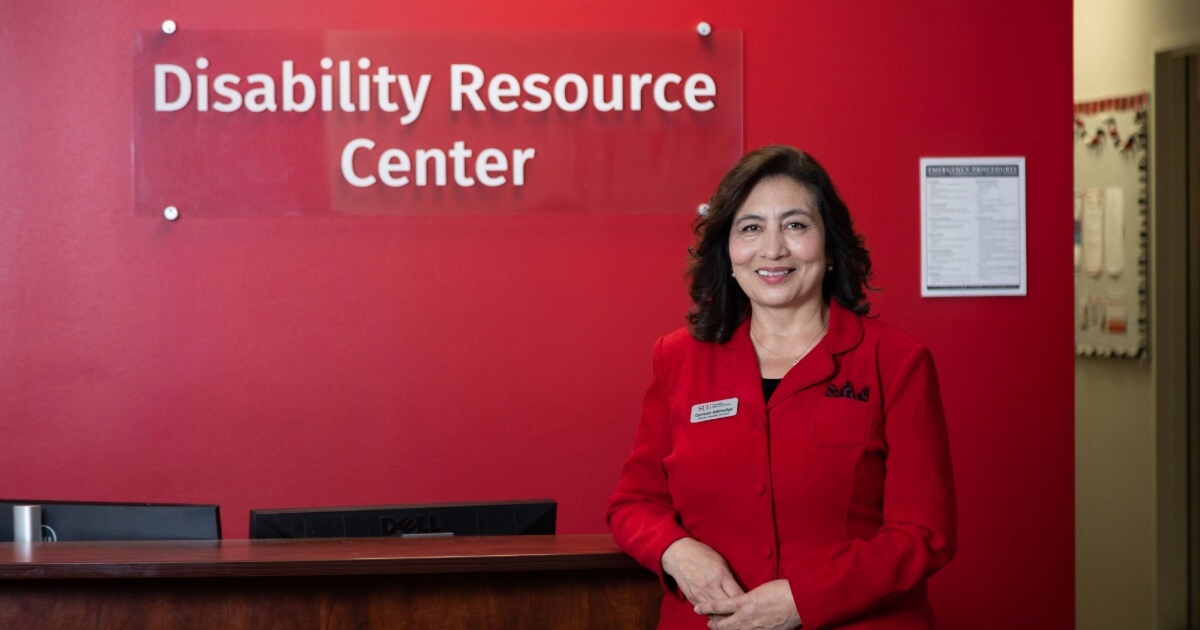Disability Resources for Online Students
Posted: October 30, 2024 | Author: Madelyn Bushman | Read Time: 4 minutes
 College is an exciting yet challenging experience, especially for students with disabilities. Navigating through academic obstacles can be difficult for anyone. With the addition of a disability –seen or unseen – earning a degree can be that much more difficult. Online students, who do not attend classes on campus, might feel alone on their academic journey. Yet others may feel relief without the distractions, anxiety, and inconvenience that they may experience in an on-campus setting.
College is an exciting yet challenging experience, especially for students with disabilities. Navigating through academic obstacles can be difficult for anyone. With the addition of a disability –seen or unseen – earning a degree can be that much more difficult. Online students, who do not attend classes on campus, might feel alone on their academic journey. Yet others may feel relief without the distractions, anxiety, and inconvenience that they may experience in an on-campus setting.
At Southern Utah University, the Disability Resource Center (DRC) is dedicated to ensuring that all students, whether on campus or online, have full access to all university programs, services, and activities. The DRC serves the needs of students with physical, emotional, and psychological issues. They are currently serving about 790 active students and 1200 overall students.
Additionally, the DRC’s work supports student success by facilitating reasonable accommodations that fit the needs of students and make their experience as a student a little easier.
Let’s take a look at how disability services may apply to online students.
Common Conditions that Warrant Accommodations
By nature, online students with disabilities may not need some of the same physical accommodations we see on campus; no need for access ramps, in-class note-takers, or specialized device checkout. And most online students likely already have any needed assistive technology at home because, well…life.
While online students may not need traditional on-campus access accommodations, they may have conditions that warrant disability resources for their online education. For example:
- Visual or hearing impairments
- ADHD/focus issues
- Mental health challenges (anxiety, depression, PTSD, etc.)
- Test anxiety
- Learning disabilities (dyslexia, dyscalculia (math), etc.)
- Reading and writing challenges
- Neurological disorders
- Immunity disorders
- Pregnancy-related health issues
- Short-term conditions
And more…
Accommodation examples for online students
The DRC provides accommodations that are individualized for each student with a disability, whether they are on-campus or online. Here are a few examples of reasonable accommodations for online students:
- Extra time (and/or attempts) for testing
- Extra time for assignments
- Textbooks in alternative formats (audiobooks, braille, etc.)
- Meetings with professors: DRC facilitates and assists students with anxiety or communication issues to meet with and get support from professors
- Otter.ai: a note transcription service that converts spoken language into written text in real time; ideal for use with pre-recorded lectures that are posted in course modules
- Speechify: a text-to-speech app that uses AI-generated voices (including those of big celebrities) to read text aloud; reads a variety of source material (books, emails, PDFs, images, articles, and text messages); also translates text into 50+ languages
“In a couple of cases with students who struggled with focus, we recommended they move to an academic program with courses just 7 weeks long, such as Political Science, Criminal Justice, or even General Studies,” said DRC Director Carmen Alldredge. “Some students can be more successful if they can study in shorter time periods.”
How to access DRC Accommodations
There is a process for students to get Disability Services from the DRC. The DRC staff wants to make sure that this process is smooth sailing for students looking for help in their learning journey.
- You will need to acquire documentation from a professional (doctor, therapist, psychologist, etc.) that includes a diagnosis and – more importantly – resulting limitations to major life activities that include school and learning.
- Then you will go to the DRC webpage.
- While on the webpage, click “Apply for Accommodations.” This involves completing a form and submitting needed documentation.
- Once the DRC receives your application, they will assign you to a case manager (assigned alphabetically by last name) and schedule an appointment with you to review your individual situation.
- Then you will enter into the “Interactive Process” where you and the DRC staff will figure out what reasonable accommodations you need.
- Once the accommodations are determined, the DRC staff will do an orientation with you to introduce the approved accommodations and show you how to use/access them.
a.) It’s important to note that accommodations must be “reactivated” each semester, and they also do not have to be used if you don’t want them. - In cases when additional documentation is needed, the DRC will do Interim Accommodations so that you can get the help you need while working to obtain the necessary documentation. These are called “interim measures” and they are provided for 2 weeks, after which they are re-evaluated with additional documentation.
As an online student, you might not have been aware of the disability resources available to you. Navigating college online with a disability can be challenging, but with the right support and resources, you can achieve great things.
Always remember that the DRC, along with your fellow T-Birds, are with you every step of the way!
If you have any questions or need assistance, don’t hesitate to reach out to the DRC.
Tags: Campus Resources Disability Resource Center SUU Online



